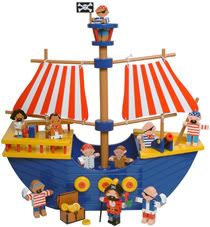Pirates
 I remember my dad telling me about some famous pirate that we're apparently related to (on his side of the family) ... something he's pretty proud of. Interesting. My mom's family history was pretty much a long line of poor farming folks. Both my parents are from Germany. I remember when I was younger and my dad would tell us about our pirating ancestor and I always thought "ya, right ... you're full of crap and just want a cool story to tell." Well, after a short search on the internet, whaddaya know! He WASN'T lying to us all that time! The story goes something like this: Klaus Stortebeker and his partner in crime, Michael Godecke were pirates that operated in the North and Baltic Seas in 1390's - 1401. They were the German versions of Robin Hood in their time.
I remember my dad telling me about some famous pirate that we're apparently related to (on his side of the family) ... something he's pretty proud of. Interesting. My mom's family history was pretty much a long line of poor farming folks. Both my parents are from Germany. I remember when I was younger and my dad would tell us about our pirating ancestor and I always thought "ya, right ... you're full of crap and just want a cool story to tell." Well, after a short search on the internet, whaddaya know! He WASN'T lying to us all that time! The story goes something like this: Klaus Stortebeker and his partner in crime, Michael Godecke were pirates that operated in the North and Baltic Seas in 1390's - 1401. They were the German versions of Robin Hood in their time.Here's a bit of copied info: They supplied besieged cities with food and ammunition, after plundering those goods from Danish merchant ships. However, the pirates soon did not only plunder Danish ships, but also the ships of England, Holland, Prussia and the German Hanse itself. The damage done by the pirates soon was so great, that in 1395 Margarete from Denmark and the German Hanse decided to make peace and take appropriate measures against the pirates. During those actions against piracy, a momentous accident happened in 1396: The fleets of Denmark and the German Hanse mistook each other for the wanted pirates and decided to shoot first and then scrutinize the identity of the enemy. The great battle was won clearly by the German Hanse. The astonishment was great as they figured out the real identity of the foe. The shocked fleet captains retreated silently with their ships and what was left of them to their home ports. In 1401, Klaus Störtebeker and 71 of his companions were caught near Helgoland Island by a treacherous trick: A fisherman, whom Störtebeker warranted protection and allowed him to sail beneath his high stern, turned out to be the enemy in disguise. The supposed fisherman pretended to cook a meal in the lee, but he melted lead instead. He then poured the liquid lead into the rudder eyelet and thus rendered the ship disabled. While Störtebeker's ship was immovable, the Hamburgians equipped a fleet and captured the pirates. For a few weeks Klaus Störtebeker was held in a dungeon called "Störtebeker's Hole". In October 1401, as Klaus Störtebeker was kneeling in front of the executioner on the Grasbrook (a tiny isle in the river Elbe in Hamburg, Germany), he was trying to buy freedom for himself and his men by offering a golden chain that should reach all around Hamburg. But the executioner showed no mercy. Legend says that Störtebeker made another deal: All those companions should be reprieved, who he could manage to walk by after being beheaded. This way he saved the lives of eleven pirates before the malicious executioner tripped him. After the pirates were decapitated their heads were spiked on poles and lined up at the river Elbe as a determent. Only six months later, Michael Godecke was captured together with his 80 companions and also beheaded in Hamburg. The valor and pride of Störtebeker was so legendary that soon many northern German cities claimed to be the home of Klaus Störtebeker, greatest of the Vitalienbrüder and leader of the Likendeelers. The immeasurable treasure of Klaus Störtebeker - a pirate who was feared from London to Novgorod - was never found.
How cool is that?! I'm pretty sure, however, that their ship was a bit more intimidating than the above pic. German pirates ... who would've thought?? Perhaps my next tattoo should have a flavour of piracy about it ...

